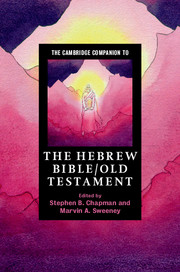Book contents
- Frontmatter
- Contents
- List of Tables, Maps, and Figures
- List of Contributors
- List of Abbreviations
- Introduction
- Part I Text and canon
- Part II Historical background
- Part III Methods and approaches
- Part IV Subcollections and genres
- 9 The Pentateuch and Israelite law
- 10 The Former Prophets and historiography
- 11 The Latter Prophets and prophecy
- 12 The Psalms and Hebrew poetry
- 13 Wisdom
- 14 Late historical books and rewritten history
- 15 The biblical short story
- 16 Apocalyptic writings
- 17 Deuterocanonical/apocryphal books
- Part V Reception and use
- Index
- Cambridge Companions to Religion (continued from page iii)
- References
15 - The biblical short story
from Part IV - Subcollections and genres
Published online by Cambridge University Press: 05 July 2016
- Frontmatter
- Contents
- List of Tables, Maps, and Figures
- List of Contributors
- List of Abbreviations
- Introduction
- Part I Text and canon
- Part II Historical background
- Part III Methods and approaches
- Part IV Subcollections and genres
- 9 The Pentateuch and Israelite law
- 10 The Former Prophets and historiography
- 11 The Latter Prophets and prophecy
- 12 The Psalms and Hebrew poetry
- 13 Wisdom
- 14 Late historical books and rewritten history
- 15 The biblical short story
- 16 Apocalyptic writings
- 17 Deuterocanonical/apocryphal books
- Part V Reception and use
- Index
- Cambridge Companions to Religion (continued from page iii)
- References
Summary
The imaginative narratives of the Hebrew Bible, perched at the edge of history writing, are often gathered and studied together as “short stories,” “novellas,” “historical novels,” and so forth. Were these narratives in fact seen as similar in the ancient world, or is it the modern fascination with fiction and the short story that motivates this grouping? It seems likely that although these stories can be grouped in different ways, with different sets of implications about their generic function in ancient Judaism, they did have a literary relationship that would have been experienced as such, consciously or unconsciously, by the ancient audience. Here I treat the Joseph story of Genesis 37–50, Ruth, Jonah, the prose frame of Job, Esther, Daniel 1–6, Susanna, Bel and the Dragon, Judith, Tobit, and the international Story of Ahikar as well. Since there are no comments in the ancient world on these texts as a genre, we are left to draw our own conclusions as to how they functioned in their original setting. They provide the kind of enjoyment and “out of history” experience that we associate with fiction, including wild exaggerations, contradictions, impossible famous personages, and logical absurdities. Yet they were all brought into at least one of the canons of the Bible, and so we are left to ask whether the ancients had a more flexible notion of what is appropriate for biblical texts or the biblical texts had come to be considered historical. Although the former is not impossible – Esther, for instance, is enjoyed in Jewish tradition as a carnivalesque reading for Purim – some are quoted authoritatively at Qumran and in the New Testament, and Josephus, writing at the end of the first century CE, included most of these narratives in his history of Israel. (He does, however, correct some of the “mistakes” that were originally part of their fictional world.) It will be my contention, then, that with the possible exception of the Joseph story, the earliest audiences did not see these stories as historical fact, and it was only later that they took on a different kind of authority, that of a written legend for Jewish heroes and heroines. It was because the stories were “biographical” or even “hagiographical” that they also could come to be “historical”; that is, hagiographa was the switch point between fiction and history.
- Type
- Chapter
- Information
- The Cambridge Companion to the Hebrew Bible/Old Testament , pp. 314 - 330Publisher: Cambridge University PressPrint publication year: 2016



